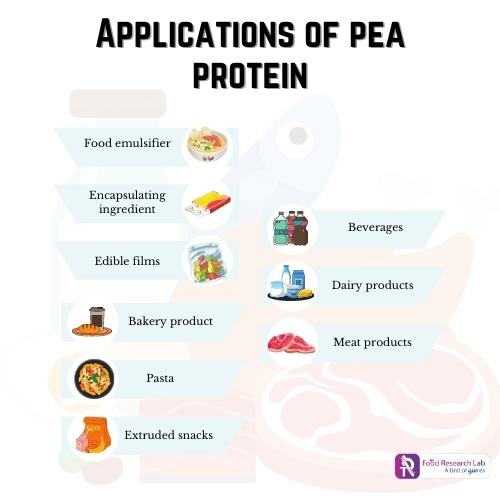Pea Protein as Functional Ingredient for Reformulation
The shift to plant based protein
- Plant based protein is gaining importance since they are more economical, ethical and sustainable. Examples of plant based protein include soybean, oat and pea.
- Although plant based protein is considered incomplete since they do not have all the essential amino acids, some exceptions include proteins derived from soybeans, peas, quinoa and amaranth.
- Plant based protein is known to lower the risk of many metabolic diseases, that include diabetes, cancer and cardiovascular diseases. Thus, plant-based proteins are finding their applications as functional ingredients in food products.
- Pea protein is a relatively new type of plant based protein derived from peas or Pisum sativum. Pea protein is available in the form of isolates, flours and concentrates.
- Various methods have been used for extracting pea protein—the processing methods include wet extraction, dry fractionation, salt extraction and micellisation. Novel methods like foam mat drying have also been studied for extracting pea protein.
Nutritional properties and health benefits of pea protein
- Pea proteins available commercially have variations in their nutritional profile, depending on the pea variety, the type of food processing and the availability of the ingredient (as isolate or concentrate). However, pea flour contains about 51% starch, 20% protein, 2% lipid, 17% fibre and 3% ash.
- On the other hand, pea protein concentrates contain 55% protein, 8% starch, 3% lipid, and 34% other carbohydrates; pea protein isolates contain 0% starch, 1% lipid, 6% ash and 70-89% protein.
- Pea proteins are regarded as high-quality proteins because they contain essential amino acids. Essential amino acids are derived from the diet and cannot be produced by the human body.
- Pea protein has a lower digestibility than whey; it provides satiety for a longer duration, aiding fat loss.
- Pea protein has shown similar results in muscle strength, thickness and workout performance compared to whey. Therefore, pea protein can be considered a suitable vegan protein substitute for whey protein.
- In addition, pea protein is hypoallergenic and has a nutritional composition similar to soy protein, making it suitable for vegans allergic to soy.
Applications of pea protein in the food industry
- Pea protein is not only nutritious but also has functional properties that make them highly desirable for use in the food and beverage industries as functional ingredients. The properties include solubility, foam-forming ability, emulsifying properties and gelation. These, in turn, enhance the products’ mouthfeel, stability, nutritional value and overall quality of food products. Therefore, start ups are incorporating pea protein in their products.

The applications of pea proteins are as follows:
- Vegan egg and meat products: Pea protein is gaining importance as a primary ingredient in formulating vegan products like vegan egg and meat substitutes. Pea protein contributes to the texture, making it applicable as fillers, binders and functional enhancers.
- Bread and baked products: Adding pea protein to gluten-containing bread improved the protein quantity and quality. Pea protein can also be included as functional food ingredients for formulating gluten free bread, which is traditionally made from pseudocereals and gluten free cereals that mimic the role of gluten. Pea protein significantly increased water retention and thickness, along with protein content. Pea protein also has the property to form stable foams, making it suitable for use in preparing baked products like eggless cakes, muffins and fudges. Some studies have also indicated that pea protein is a better foaming agent than soy protein.
- Extruded snacks: Pea protein isolate can be used to fortify extruded snacks. Pea protein isolate enriched extruded snacks have a higher protein content and a more balanced amino acid profile than pure starch extrusion.
- Pasta- Pea protein can be added to enhance the protein content of pasta. In addition, pea protein also offers benefits like controlling glucose release during digestion, thereby influencing the glycaemic index of the final product.
- Food emulsifiers: The emulsifying properties of pea protein make it highly desirable among consumers for plant based protein sources. Pea protein has been utilised as an emulsifier in liquid and spray-dried emulsions for the microencapsulation of oil. Pea protein forms a rigid membrane at the oil-water interface, lowering interfacial tension and stabilising emulsions. According to certain studies, Pea protein is a superior emulsifying agent than soy protein at neutral pH.
- Films for food products: Pea protein can form films, making it suitable for developing edible films for food products. Studies have shown that pea protein isolates have greater tensile strength and barrier properties against water and oxygen.
- Beverages: Pea protein can be used as a functional beverage ingredient in non-fermented and fermented beverages to increase the protein content and improve aroma, appearance and sweetness in fermented beverages.
- Dairy products: Pea protein can be used instead of soy protein for formulating vegan milk, for there is an increasing concern regarding the regulation of GMO status, allergenicity and phytoestrogens in soy.
- Encapsulating ingredient: Encapsulation is used for preserving the properties of bioactive compounds that offer numerous health benefits. Pea protein can be used for encapsulating bioactive compounds like omega-3 and β-tocopherol, which are susceptible to degradation. Encapsulated omega-3 and β-tocopherol can be used for food fortification [1].
Conclusion
Pea protein is a recent type of plant based protein that contains essential amino acids. It shows similar properties to whey in terms of muscle strength and workout performance, making it a suitable vegan protein substitute. In addition, it also offers functional properties to food, like enhancing the mouthfeel that, makes it suitable as a functional ingredient for formulating food and beverage products.
How the Food Research Lab can help
We are a team of food technologists offering services in ingredient development for food and beverage products. We assist food and beverage industries formulate products with ingredients that enhance their nutritional profile. We comply with the regulations while developing products, making them easier to launch. We also conduct numerous rounds of sensory evaluation that significantly improve the consumer acceptability of the products, ensuring their success.

Let’s create something Innovative and Delicious together
Food Research Lab strives for excellence in new Food, Beverage and Nutraceutical Product Research and Development by offering cutting edge scientific analysis and expertise.




